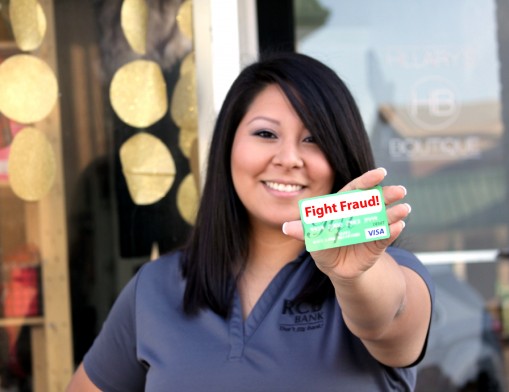A Word of Caution about Fraud
Financially Fit is a column published by RCB Bank to help you gain knowledge on all things financial. Fitness guides – RCB Bank professionals in the field – offer ideas to help you strengthen your money sense, customize savings training, and provide qui
By: By D. Meyer, RCB Bank Fraud Department | Category: Financial Services | Issue: October 2015

Safeguard your personal information so it doesn’t fall into the wrong hands. Pictured: Tamra Laimore.
I cannot stress enough the importance of using caution when it comes to using the Internet, checking your emails and answering phone calls. Criminals are savvy con artists who steal billions of dollars from people each year.
Fraudsters are masters of age-old deception tricks. Often times, they persuade victims to hand over personal information and money willingly through telemarketing, Ponzi schemes and Internet scams.
Avoid becoming a victim and take steps to protect you and your money.
Don’t be fooled by promises. If you receive mail or a phone call stating you’ve won a free gift and all you need to do is pay postage or a small deposit, walk away. Con artists use convincing telemarketing to deceive victims. Mail may look like official letterhead from well-known companies. Criminals may cunningly pretend to represent local charities.
Adopt these principles:
Only pay for goods and services after you receive them.
Before giving money to a charity, personally investigate the company - find out how the money is used.
Never buy from an unfamiliar company – check the Better Business Bureau and Attorney General Office to see if any complaints have been filed against them.
If it sounds too good to be true, it is. Don’t be duped by instant cures, quick riches and guaranteed profits.
Never make a snap decision.
Never ever provide credit or debit card numbers, expiration dates, bank account numbers, birth dates, or Social Security numbers to persons over the phone, in emails or on the Internet, unless you are 100 percent certain your information is safe.
Don’t be pressured by scare tactics. Fraudsters like to frighten victims into thinking they owe money to the IRS, or threaten arrest if they don’t pay an outstanding balance. Criminals can get their hands on public records and personal information from the Internet and social media networks, and create plausible schemes. Before you act out of fear, seek the truth.
Call the company directly to verify. Do not call the number provided to you. Call the number in the phonebook or on the company’s official website.
Review your bills and statements carefully. Fraudsters may claim you owe money for services not performed or send you fake bills.
Talk to your personal financial advisor before agreeing to any solicited investment proposal.
Safeguard your personal information. There are hundreds of scams, like phishing, texting, pop-up windowns, downloads, skimming and spyware, to trick you into revealing personal information. Assume anything you post or send online or via phone is public. Take these precautions to protect yourself:
Do not reveal any personal information, including your whereabouts online, e.g., social media check-in status.
Install anti-spyware software and update it regularly.
Check your accounts often, looking for unusual activity.
Do not agree to let online sites remember your passwords – this is an open door for hackers.
Always sign off or log out properly.
Do not click on links in emails without verifying the source. Often times, scammers will send you mail from a familiar address in your contact list.
Criminals do not discriminate. All ages and demographics are at risk. As Ben Franklin once said, “An ounce of prevention is worth a pound of cure.”
The Federal Trade Commission, ftc.gov, and Federal Bureau of Investigation, FBI.gov, offer recent scam alerts and more tips for fraud protection.
We are happy to answer any questions you may have. Call us at 855-BANK-RCB or visit your local RCB Bank location.
RCB Bank
For more information, contact:
RCB Bank Online:
More about RCB Bank:
More ArticlesCurrent Coupons/OffersSubscribe
For Free!
